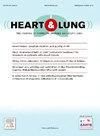性别和年龄可预测肥厚型心肌病基因阴性患者的晚期心力衰竭。
IF 2.4
4区 医学
Q2 CARDIAC & CARDIOVASCULAR SYSTEMS
引用次数: 0
摘要
背景:肥厚型心肌病(HCM)患者可能会并发晚期心力衰竭(HF)。然而,关于没有肉粒基因突变的 HCM 患者晚期 HF 的临床结果的数据却很有限:在一个大型 HCM 队列中确定基因阴性患者晚期 HF 的预后因素:1999年至2018年间,共有1529名无亲属关系的HCM患者入组,并在整个研究期间进行了随访。所有患者均接受了全外显子组或面板测序的基因分型。在这批患者中,有 735 名患者未发生基因突变。我们评估了家族史、临床发现和超声心动图参数对晚期心房颤动发展的影响。我们进行了多变量考克斯比例危险回归分析,以确定与晚期房颤相关的风险因素:在研究的 735 例基因阴性患者中,平均年龄为(52.5±13.2)岁,69.5% 为男性,平均随访时间为(3.2±2.3)年。在此期间,97 名患者(13.2%)发展为晚期心房颤动。通过多变量分析,我们发现了晚期心房颤动的重要风险因素:女性性别(调整后危险比 [HR] 2.499,95% 置信区间 [CI] 1.531-4.081,PC结论:女性性别和年龄较大可能预示着基因阴性的 HCM 患者罹患晚期 HF 的风险较高。早期发现和积极治疗对于控制和预防这些患者的并发症至关重要。本文章由计算机程序翻译,如有差异,请以英文原文为准。
Gender and age predict advanced heart failure in gene-negative patients with hypertrophic cardiomyopathy
Background
Patients with hypertrophic cardiomyopathy (HCM) may develop concomitant advanced heart failure (HF). However, there is limited data on the clinical outcomes of HCM patients without sarcomere gene mutations who have advanced HF.
Objectives
To identify prognostic factors for advanced HF in gene-negative patients within a large HCM cohort.
Methods
A total of 1529 unrelated patients with HCM were enrolled between 1999 and 2018, and followed throughout the study period. All patients underwent genotyping through whole exome or panel sequencing. From this cohort, 735 patients without mutations were studied. We assessed the effects of family history, clinical findings, and echocardiographic parameters on the development of advanced HF. Multivariable Cox proportional hazards regression analysis was conducted to identify risk factors associated with advanced HF.
Results
Of the 735 gene-negative patients studied, the mean age was 52.5±13.2 years, 69.5% were male, and the mean follow-up duration was 3.2±2.3 years. During this period, 97 patients (13.2%) developed advanced HF. Using multivariable analysis, we identified significant risk factors for advanced HF: female gender (adjusted hazard ratio [HR] 2.499, 95% confidence interval [CI] 1.531–4.081, P<0.001) and older age at enrollment (adjusted HR 1.298, 95% CI 1.00–1.682, P=0.049). These findings suggest that female patients and those enrolled at an older age are at a higher risk for developing advanced HF.
Conclusion
Female gender and older age may predict a higher risk of advanced HF in gene-negative patients with HCM. Early detection and proactive treatment are crucial for managing and preventing complications in these patients.
求助全文
通过发布文献求助,成功后即可免费获取论文全文。
去求助
来源期刊

Heart & Lung
医学-呼吸系统
CiteScore
4.60
自引率
3.60%
发文量
184
审稿时长
35 days
期刊介绍:
Heart & Lung: The Journal of Cardiopulmonary and Acute Care, the official publication of The American Association of Heart Failure Nurses, presents original, peer-reviewed articles on techniques, advances, investigations, and observations related to the care of patients with acute and critical illness and patients with chronic cardiac or pulmonary disorders.
The Journal''s acute care articles focus on the care of hospitalized patients, including those in the critical and acute care settings. Because most patients who are hospitalized in acute and critical care settings have chronic conditions, we are also interested in the chronically critically ill, the care of patients with chronic cardiopulmonary disorders, their rehabilitation, and disease prevention. The Journal''s heart failure articles focus on all aspects of the care of patients with this condition. Manuscripts that are relevant to populations across the human lifespan are welcome.
 求助内容:
求助内容: 应助结果提醒方式:
应助结果提醒方式:


